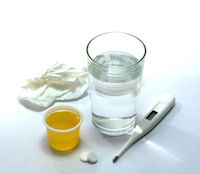 Coughs, colds and their more serious cousins are out and about in force during the colder months. Just because everyone gets them doesn’t mean they are a walk in the park – even a decent head-cold will make you feel decidedly average for a few days, so take all reasonable precautions to avoid illness this winter.
Coughs, colds and their more serious cousins are out and about in force during the colder months. Just because everyone gets them doesn’t mean they are a walk in the park – even a decent head-cold will make you feel decidedly average for a few days, so take all reasonable precautions to avoid illness this winter.
Eat well and supplement appropriately
Cold weather can trick you into thinking you need to stay inside and reach for the stodge to keep warm. Don’t be fooled. Keep up the brightly coloured fruits and vegetables (yellows, oranges and reds are particularly useful against some viruses, so stock up!), warm fluids and high-nutrient meals.
Talk to your pharmacist or GP about supplements; it takes extra energy to keep warm, so you may find yourself depleted in some nutrients. There is evidence that vitamin C, vitamin D and zinc supplements can help prevent or reduce the severity of colds and viruses, so seek professional advice as to whether you may benefit from a supplement in the short term. It is important not to self-prescribe as vitamins and natural remedies can interfere with other medication.
Wash your hands and watch where you put them
Hand washing is one of the most effective ways to prevent illness. Remember the happy birthday rule; sing it to yourself as you wash with soap and warm water, at the end of the song, you will have reached the 20 second optimal wash time. It is also important to dry your hands thoroughly. Wash your hands after going to the toilet, or when you come home. Door handles, steering wheels, trolley handles and public spaces can be a breeding ground for germs, so wash well to avoid bringing them home with you! It’s a good idea to keep antibacterial hand wipes or sanitiser in your bag or car if it isn’t easy to wash your hands before you eat while you are out.
Learn good sickness etiquette
Cover your mouth or nose with your elbow when you cough or sneeze, rather than your hand. It helps prevent contaminating others with a handshake!
Better still, if you are feeling unwell, stay home. It is better for you to take a day off if you are unwell, as the rest will help you recuperate, and it is never kind to take your germs to work.
Similarly, if you have grandchildren or friends coming to visit, it is fine to ask them to stay away if they aren’t well.
The average cold lasts between five and seven days. If you do contract one; rest, drink plenty of warm fluids, eat light meals and take paracetamol to alleviate the symptoms. If you take stronger remedies, remember masking symptoms will not hasten recovery and may have the opposite effect if you don’t allow your body to rest and repair.









Join the Discussion
Type out your comment here:
You must be logged in to post a comment.